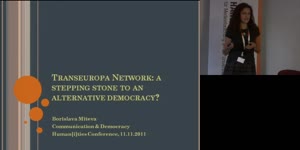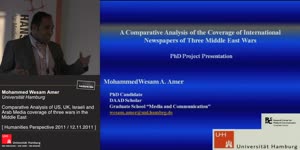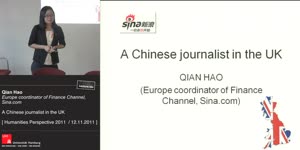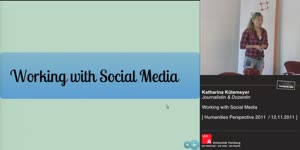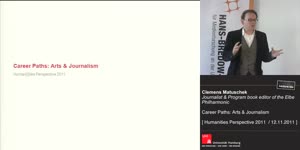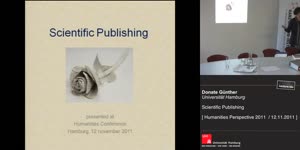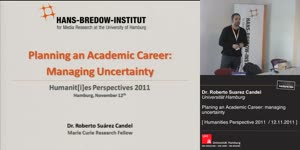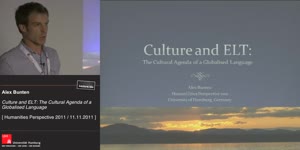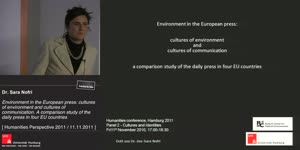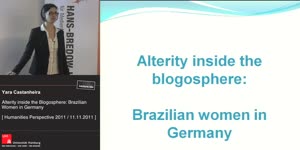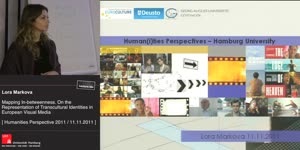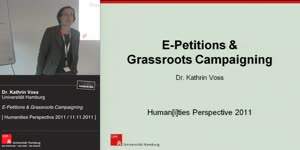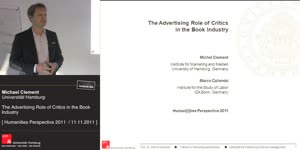Cultures of environment and cultures of communication in Europe: Some innovative methodological features and results from a comparative study of the daily press in Germany, Great Britain, Italy and Sw - Dr. Sara Nofri - Universität Hamburg
- Lecture2Go
- Videokatalog
- F.5 - Geisteswissenschaften
- Sonstiges
- Humanities Perspective 2011
Videokatalog
Cultures of environment and cultures of communication in Europe: Some innovative methodological features and results from a comparative study of the daily press in Germany, Great Britain, Italy and Sw
Some innovative methodological features and results from a comparative study of the daily press in Germany, Great Britain, Italy and Sweden”
Sara.nofri(at)uni-hamburg.de
ABSTRACT: In spite of environmental policy convergence within the EU and of common environmental problems like e.g. those due to global warming, a public sphere and a common debate about environmental issues have not really been established within the EU yet.
A key-role in shaping public sphere and public debate about environmental issues in Europe is played by the media. The medium “daily press”, however, still used for delivering in-depth information and pointing out backgrounds and details about current issues, addresses prevalently national audiences, which have their own language and their own ways of communicating and perceiving what environmental issues consist of. Also the media output side presents significant differences between “journalistic cultures” (Hallin and Mancini, 2004) that need to be accounted for. Nevertheless, a common basis for discussion or at least a greater awareness of cultural differences are necessary, if common problems have to be tackled democratically, thoroughly and together.
With these premises, the author has carried out a multilingual and interdisciplinary study at the University of Hamburg. The study describes the ways in which the national press of four European countries (Germany, Great Britain, Italy and Sweden) deals with environmental issues and portrays which sources, themes and stakeholders take the floor. Through a both quantitative and qualitative content analysis of eight newspapers, differences in form and content of environmental press coverage are pointed out, thereby showing how in the European Union different “cultures of environment” and different “cultures of communication” coexist. Interviews with journalists who cover the environmental news for their newspapers add sharpness to the picture of European environmental journalism in the printed press.
The author would be glad to present some innovative methodological details behind her multilingual research study, some results of the empirical study, and the outcome of some interviews, as an anticipation of her soon-to-be-published piece of research. The statement “Innovative methodological details” refers to the fact that, unlike in this case, very few media research studies draw from library science in organising systematic multilingual database or bibliographical research, and they seldom account for more than one language or culture when carrying out a content analysis or interviews. Cultures and identities, however, can be the subject of scientific research itself, not only its object.
BIO: Sara Nofri, 33, is going to be awarded her PhD in Communication Science at the University of Hamburg in the coming days. She holds an MA in Conference Interpreting and Translation Studies at the University of Bologna, studied Political Science and Scandinavian Studies at the Ruhr-University Bochum and was awarded a Hans-Böckler Foundation PhD scholarship. Thanks to several EU scholarships (SOCRATES, COMENIUS, LEONARDO) she was able to study, travel, teach and carry out research in different European countries, mostly in Sweden, Italy, Germany and the UK. These are the countries she wrote her doctoral thesis about, comparing multilingually, quantitatively and qualitatively their press coverage of environmental issues, and carrying out interviews with environmental journalists from those countries. Currently, she teaches classes at the Departments of Journalism and of Advanced Academic Training (court interpreting) of the University of Hamburg. She also was able to gain significant experience in several professional sectors, such as research (e.g. Wuppertal Institut für Klima, Umwelt, Energie), research funding , events with an international background, and education.
-
 00:00:00The Concept
00:00:00The Concept -
 00:05:18The Questions
00:05:18The Questions -
 00:06:53Quantity and average page number
00:06:53Quantity and average page number -
 00:14:38Newspaper sections
00:14:38Newspaper sections -
 00:15:53Actors covered
00:15:53Actors covered -
 00:16:22Themes covered
00:16:22Themes covered

